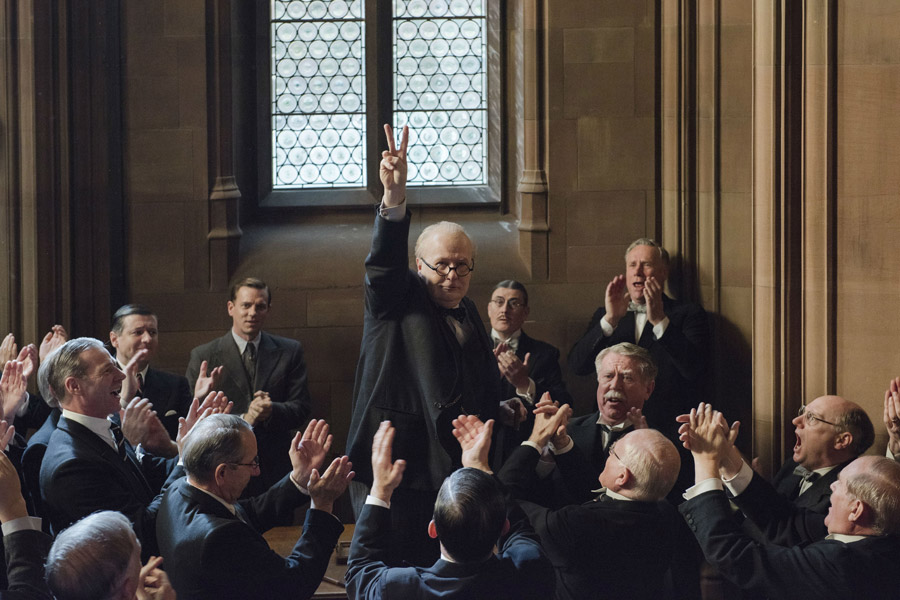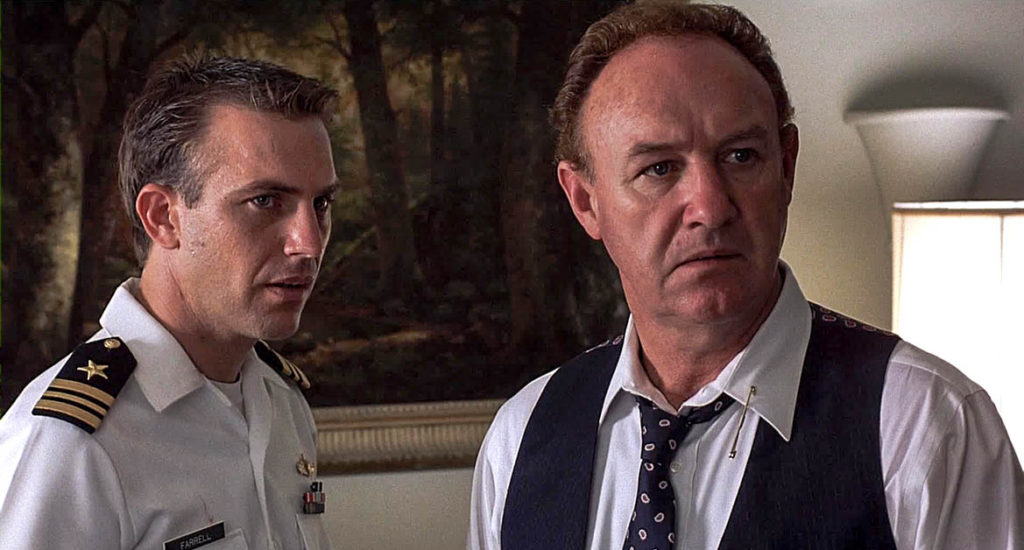Hamilton (2020)
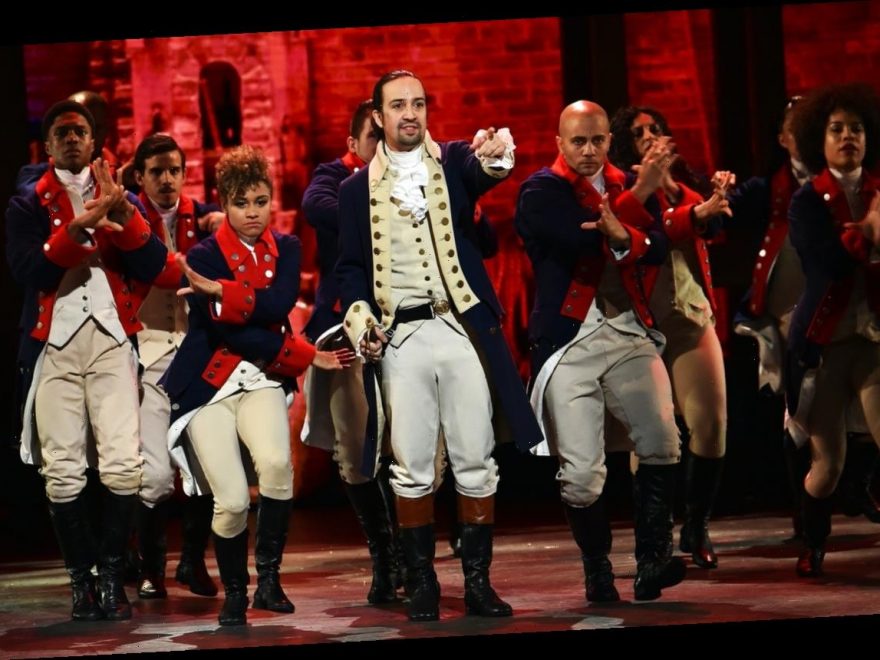
DIRECTOR: Thomas Kail
CAST: Lin-Manuel Miranda, Leslie Odom Jr., Christopher Jackson, Phillipa Soo, Renée Elise Goldsberry, Daveed Diggs, Jonathan Groff
REVIEW:
Counting Hamilton as a “movie” is using the term loosely, rather a live film recording of the original run of the 2015 Broadway musical featuring its original cast, but while no filmed recording can fully recreate the immersive nature of seeing a show live, Hamilton‘s release on online streaming service Disney + (following Disney outbidding all competition to call dibs on the film rights) gives a chance for those who missed or could not afford the opportunity to buy Broadway tickets, or those who wish to revisit the play’s original run with its original cast, a chance to experience the phenomenon for themselves. A musical adaptation of Ron Chernow’s 2004 biography of American Founding Father Alexander Hamilton, with Broadway star Lin-Manuel Miranda composing the songs, writing the lyrics, and starring in the title role, Hamilton deserves its success and popularity. While non-musical fans might not be converted, for those to whom the medium appeals, it’s a lively, lavish, passionate production of the highest quality combining rap, pop, and showtunes to turn a biography into an engaging and energetic modernized history lesson that both educates and entertains.
Continue readingVice (2018)
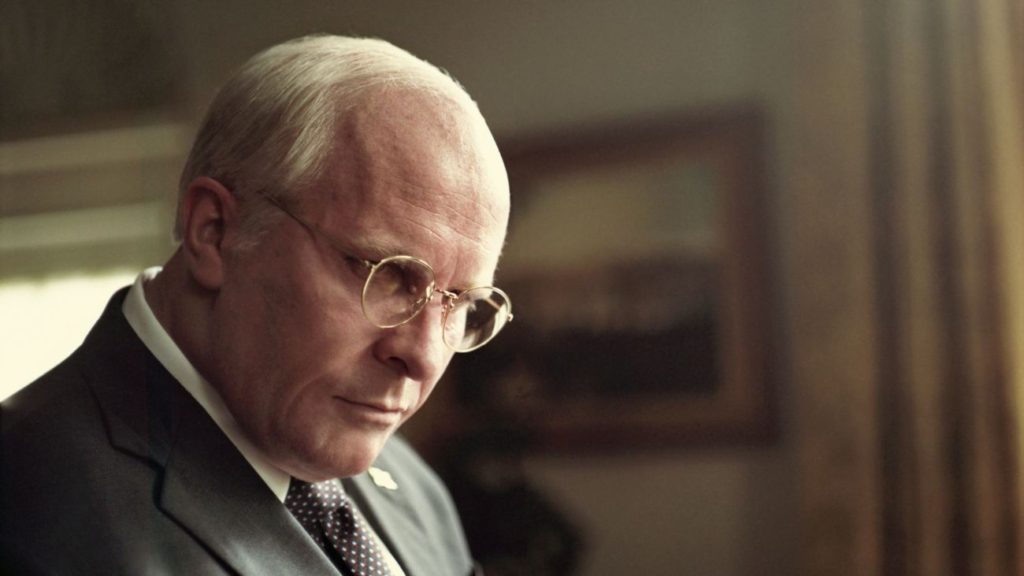
DIRECTOR: Adam McKay
CAST: Christian Bale, Amy Adams, Steve Carell, Sam Rockwell, Jesse Plemons
REVIEW:
Vice might be billed as a dark comedy, but the occasional absurdist flair only slightly softens the blow of what is essentially a political horror movie. As he did with 2015’s The Big Short—also starring Christian Bale and Steve Carell—Adam McKay uses a comedy-drama approach to bring flair and panache to what on paper sounds like a dry, dull subject for a movie (in The Big Short, the 2007-2008 financial crisis, here the distinctly uncharismatic former Vice President Dick Cheney). In this regard, there’s a little resemblance to what David Fincher/Aaron Sorkin and later Danny Boyle/Aaron Sorkin did with The Social Network—about Facebook founder Mark Zuckerberg—and Steve Jobs—about the late Apple CEO—but suffice to say McKay again puts his own offbeat fingerprints on the proceedings.
Continue readingThe Post (2018)
CAST: Meryl Streep, Tom Hanks
REVIEW:
The Post won’t appeal to everyone—it’s a predominantly dry, talky affair full of scenes of stressed-out people in smoky rooms and stacks of papers debating the course of action—-but for those who appreciate docudramas celebrating the triumph of investigative journalism over power, it’s a stirring spiritual brother to movies like All the President’s Men (to which it serves as a sort of direct prequel) and Spotlight. In its portrayal of the free press versus an American President skirting the limits of his authority, The Post feels timely and relevant, and stresses the importance of an independent press. The Supreme Court’s 1971 ruling that “the press exists to serve the governed, not the governors” is worth recalling today. Continue reading
Darkest Hour (2017)
CAST: Gary Oldman, Lily James, Kristin Scott Thomas, Ben Mendelsohn, Stephen Dillane, Ronald Pickup
REVIEW:
2017 has been a good year for the Dunkirk evacuation, a pivotal event in WWII but an incident which had previously received little Hollywood attention. Combined with Christopher Nolan’s “you are there” docudrama Dunkirk, which took us to the beaches, onboard the ships, and into the sky, and Lone Scherfig’s Their Finest, about a British propaganda film made about the event, Darkest Hour takes us to the vantage point of 10 Downing Street and centers around Winston Churchill himself. To this end, Darkest Hour features no real battle scenes—apart from fleeting glimpses—and its talky tone will limit its primary audience to history buffs, especially those with a particular interest in Churchill, but for those who consider themselves in that category, Darkest Hour is an engaging docudrama about the first two weeks in office of perhaps Britain’s most famous Prime Minister, and how he almost lost the position not long after he attained it. Continue reading
Snowden (2016)
CAST: Joseph Gordon-Levitt, Shailene Woodley, Rhys Ifans, Zachary Quinto, Tom Wilkinson, Melissa Leo, Nicolas Cage
REVIEW:
Given his attraction to controversial, politically-charged fare, it’s no surprise that Oliver Stone would end up being the one to make a film about Edward Snowden, the NSA/CIA analyst-turned-whistleblower who became an internationally wanted fugitive (currently living under temporary residence in Moscow) after leaking thousands of classified files exposing unconstitutional government wiretapping and mass surveillance programs. Whether Snowden deserves the label “hero” or “traitor” (or to some extent maybe even both) varies widely depending on who you ask, but the content of his leaks, whatever one may feel about his methods or the man himself, should give anyone a moment’s pause. Perhaps Snowden‘s biggest drawback as a film is that it doesn’t necessarily bring anything new to the table that can’t already be gleaned from a documentary on the same subject, Citizenfour (ironically the same complaint that can be made of another Joseph Gordon-Levitt vehicle, last year’s The Walk), but it’s still a compelling biopic/docudrama that doesn’t require one to be particularly familiar with the real Edward Snowden to find the film interesting viewing. Continue reading
Frost/Nixon (2008)
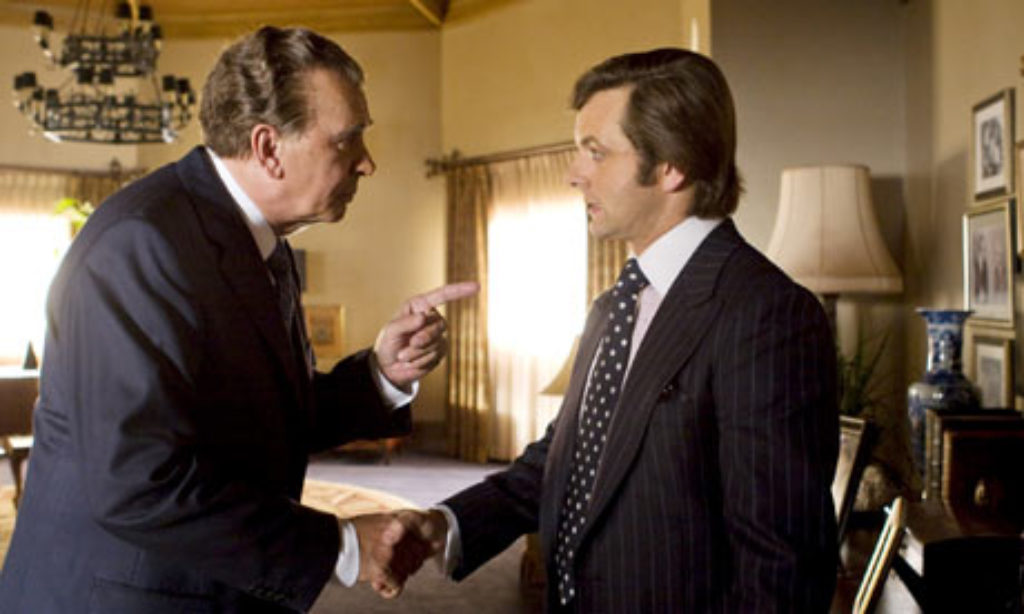
DIRECTOR: Ron Howard
CAST: Michael Sheen, Frank Langella, Kevin Bacon, Sam Rockwell, Oliver Platt, Matthew Macfadyen, Rebecca Hall, Toby Jones
REVIEW:
For the latest entry on an eclectic filmography, Ron Howard has teamed up with playwright/screenwriter Peter Morgan for this film adaptation of Morgan’s own play, a semi-fictionalized docudrama chronicling the 1977 interview pitting British talk-show host David Frost against former President Richard Nixon. To this end, they have managed the impressive accomplishment of turning what could have been a dry, stuffy subject into a powerful and compelling drama and character study, proving that slick cinematic craftsmanship, an intelligent script, and powerhouse acting can take something seemingly mundane—an interview—and make it intensely riveting.
Continue readingV For Vendetta (2006)
DIRECTOR: James McTeigue
CAST:
Hugo Weaving, Natalie Portman, Stephen Rea, Stephen Fry, John Hurt, Tim Pigott-Smith
REVIEW:
Based on the controversial graphic novel by Alan Moore, and produced by the Wackowski brothers behind The Matrix, V For Vendetta mostly succeeds at serving up both entertaining action and a few eerily timely bits of political commentary, and represents a case of being entertained without having to leave your brain at the door.
On November 5, 1605, as many will know, a man named Guy Fawkes attempted to blow up Parliament and was hanged for his trouble. In the future, with war and a deadly biological terrorist attack (or at least that’s the official story) leading to order being restored in Britain by a Fascist totalitarian government, a man known only as V (Hugo Weaving), who hides his burned features behind a Guy Fawkes mask, seeks to unleash a wave of theatrics, rabble-rousing, bombings of London landmarks, and assassinations of prominent government officials that will culminate in the destruction of Parliament on Guy Fawkes Day. Like the man he emulates, V is either a freedom fighter or a terrorist depending on who you talk to. This is the dilemma faced by Evey Hammond (Natalie Portman), an ordinary citizen whom V saves from rape by the thuggish police after being caught on the street after curfew and then casually invites to watch as he detonates the Old Bailey building, the opening salvo of his one-man fight. The dictatorship, headed by the rarely-seen High Chancellor Sutler (John Hurt), tries to maintain a facade of control by explaining the building as a planned demolition, but V theatrically takes over a major news network to set the record straight. Over the next year, V moves like a wraith through London, simultaneously setting his government overthrow in motion and carrying out a personal vendetta against the government officials involved in his past sufferings. Evey tags along, not entirely willingly at first, then having to decide whether to escape V or support him. Meanwhile, Inspector Finch (Stephen Rea) is leading the investigation to stop V, but in the process stumbles across buried atrocities that make him question whether the real villain might be his own government.
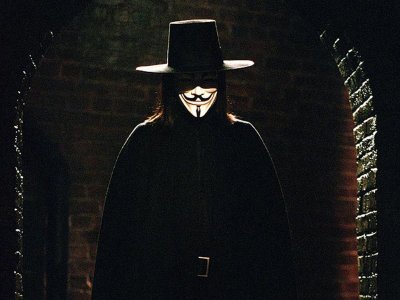 V for Vendetta is a rousing and thought-provoking experience even when it threatens to lapse into overwrought chaos. Like The Matrix, it’s bursting with ideas beneath its stylized action surface. It contains any number of moments to get the pulse quickening and the nape hairs standing, and asks tough questions about how far we should go in the name of security, and what defines a terrorist. The filmmakers also don’t let the stylized look and feel overwhelm the human element. In fact, the most indelible part of the movie is a lengthy subplot in which Evey reads the letter of a lesbian prisoner tortured and murdered by the government, that is so striking because its inclusion is so unexpected. And it’s hard not to see shades of Phantom of the Opera in the relationship between V and Evey. Like The Phantom, V hides disfigurements behind a mask and threatens to let personal vengeance overwhelm his claims of righteousness.
V for Vendetta is a rousing and thought-provoking experience even when it threatens to lapse into overwrought chaos. Like The Matrix, it’s bursting with ideas beneath its stylized action surface. It contains any number of moments to get the pulse quickening and the nape hairs standing, and asks tough questions about how far we should go in the name of security, and what defines a terrorist. The filmmakers also don’t let the stylized look and feel overwhelm the human element. In fact, the most indelible part of the movie is a lengthy subplot in which Evey reads the letter of a lesbian prisoner tortured and murdered by the government, that is so striking because its inclusion is so unexpected. And it’s hard not to see shades of Phantom of the Opera in the relationship between V and Evey. Like The Phantom, V hides disfigurements behind a mask and threatens to let personal vengeance overwhelm his claims of righteousness.
It’s telling of Hugo Weaving’s acting ability that he manages to generate such a strong, charismatic screen presence without once showing his face (his mask is unmoving, meaning he has no way of conveying even a hint of emotion with anything other than his voice and body language). Weaving uses his meticulously precise enunciation and commanding vocal tones to great effect- he delivers a rapid-fire monologue in which every word starts with v that has to be heard to be believe- and also gets to engage in a little Errol Flynn-style swashbuckling (although the fact that V’s features are hidden makes it impossible to determine when it is Weaving and his fight double). Natalie Portman is adequate, and at various times more than adequate, but her performance is a little uneven, and her somewhat forced English accent is somewhat distracting. Portman is particularly good during the infamous torture scene where her head is shaved, but also a few too many moments where she doesn’t seem to quite have quite a firm handle on her character. More solid is Stephen Rea, who uses his usual hangdog demeanor to good effect as Inspector Finch. In fact, despite his low-key performance, Rea’s Finch could be said to be the most three-dimensional and sympathetic character in the movie- a man with a job to do who finds nothing about his job is turning out as simple as he expects. In smaller roles, Stephen Fry is a talk show host who uses his program to slip in dissent against the government and befriends Evey, and John Hurt spends 99% of his limited screentime with his ever-angry visage amusingly projected onto a wall-sized television monitor faced by a half-circle of dwarfed underlings like some embodiment of Big Brother while he snarls and thunders about V’s antics. As his secret police chief henchman, and arguably the real primary villain, Tim Pigott-Smith is suitably oily.
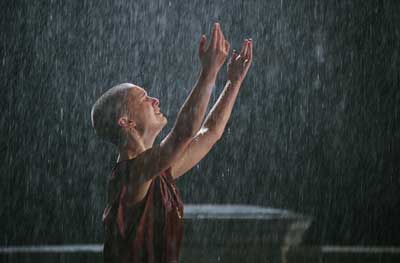 The climax is easily the weakest thing about V for Vendetta. In particular, our final brief face-to-face with Chancellor Sutler is disappointingly anti-climactic. One wonders if the filmmakers were making a statement about some dictators being figureheads to the real power behind the throne, or one’s public image not matching up with the real person, but in any case, Sutler turning out to be so pathetic kills the momentum provided by a centralized hub of villainy to battle against, and once he’s quickly here and gone, all we have left is a shootout enlivened with some (arguably too many) moves obviously inspired by The Matrix, and the destruction of Parliament, which seems a little pointless. I understand a large part of V’s mission is symbolic, creating grand spectacles to snap the public out of their apathy, but since the dictatorship has been effectively destroyed by this point, it seems the gratuitous annihilation of a historic British building. Then again, maybe we’re not supposed to be sympathizing with V by this point. In any case, the climax is disappointingly flat, even with the cool fight scenes and massive explosions, considering the build the narrative had generated leading up to it. The dictatorship goes out with a disappointing and rather anti-climactic whimper, even if V and Evey send it off with a closing bang.
The climax is easily the weakest thing about V for Vendetta. In particular, our final brief face-to-face with Chancellor Sutler is disappointingly anti-climactic. One wonders if the filmmakers were making a statement about some dictators being figureheads to the real power behind the throne, or one’s public image not matching up with the real person, but in any case, Sutler turning out to be so pathetic kills the momentum provided by a centralized hub of villainy to battle against, and once he’s quickly here and gone, all we have left is a shootout enlivened with some (arguably too many) moves obviously inspired by The Matrix, and the destruction of Parliament, which seems a little pointless. I understand a large part of V’s mission is symbolic, creating grand spectacles to snap the public out of their apathy, but since the dictatorship has been effectively destroyed by this point, it seems the gratuitous annihilation of a historic British building. Then again, maybe we’re not supposed to be sympathizing with V by this point. In any case, the climax is disappointingly flat, even with the cool fight scenes and massive explosions, considering the build the narrative had generated leading up to it. The dictatorship goes out with a disappointing and rather anti-climactic whimper, even if V and Evey send it off with a closing bang.
Even so, V for Vendetta is frequently thrilling, frequently thought-provoking, possessed of both a mind and a heart, and serves up a far richer experience than your average action thriller.
***
The Constant Gardener (2005)
DIRECTOR: Fernando Meirelles
CAST:
Ralph Fiennes, Rachel Weisz, Danny Huston, Bill Nighy, Pete Postlethwaite, Hubert Koundé, Gerard McSorley, Richard McCabe
REVIEW:
John le Carre’s densely plotted thrillers, blending the usual cloak-and-dagger international intrigue with labrynthine plots which unravel bits and pieces at a time, have a reputation for being difficult to adapt to the screen with their essence and fundamental story and message intact. But Brazilian director Fernando Meirelles and screenwriter Jeffrey Caine have condensed the essence of le Carre’s novel into a slow-burn, unconventional thriller which combines the saga of a man’s search for truth with a simmering indictment of government and business corruption in Africa. Continue reading
No Way Out (1987)
CAST: Kevin Costner, Gene Hackman, Sean Young, Will Patton, George Dzundza, Howard Duff, Fred Dalton Thompson, Jason Bernard, Iman
REVIEW:
No Way Out stands in worthy company alongside other ’80s and early ’90s thriller such as Narrow Margin (also featuring Gene Hackman): meat-and-potatoes thrillers that deliver enough mounting tension and suspense to override some plot contrivances and unlikelihoods.
Tom Farrell (Kevin Costner) is a Naval officer newly assigned to work for Secretary of Defense David Brice (Gene Hackman). But Farrell and Brice share more than an office: Farrell has started a steamy clandestine affair with Susan Atwell (Sean Young), who does double duty as Brice’s mistress. And when Brice gets wind of another man and accidentally kills her in a jealous rage, Brice’s fanatically loyal aid Scott Pritchard (Will Patton) orchestrates a cover-up under the guise of a secret investigation, scapegoating “Yuri”, a long-rumored, never-seen Soviet spy who can pass as an American and has infiltrated the Pentagon, as Susan’s killer. The plan seems perfect: the investigation is hunting a ghost. But Farrell finds himself being steadily sucked into a downward spiral of trouble the closer the investigation comes to identifying him, Susan’s secret lover, as the suspect in her death.
No Way Out borrows a page or two from Hitchcock in the way it continually ups the ante. Things start slowly for the first half hour or so, as we see Farrell in hot-and-heavy bliss with Susan. Then Ms. Atwell makes her exit, and Farrell is trapped in an impossible situation, helping run an investigation that will lead to his own destruction (unless he can steer it off course), that seems to have, as the title states, “no way out”.
Kevin Costner gives (by his standards) a forceful and energetic performance, probably one of his best, although the material isn’t long on character development (the characters are pawns in the unwinding plot that none of them quite has a complete grip on, even when they think they do). Farrell is a tricky character; since he knows something no one around him knows, and wants to keep it that way, Costner always has to stay stoic and collected, but also project the tension building minute by minute as he feels increasingly trapped. Gene Hackman is his usual reliable self as Brice, but other than the big “Susan’s demise” scene, he doesn’t have all that much to do. Brice isn’t “evil”, so much as weak; he comes crawling miserably to Scott like a little boy who made a mess and wants it cleaned up before Daddy finds out (incidentally, Hackman plays a virtually identical character years later in the Clint Eastwood thriller Absolute Power). Will Patton’s obsessively devoted aid is the real villain of the movie, and dives right in with a kind of hyper-efficient glee bubbling beneath his self-righteous unctuousness, going off on his own little power trip while masterminding a cover-up to protect the boss he worships. The throwaway bit of dialogue in which Scott is revealed to be gay is a bit of a homophobic cheap shot (typical of ’70s and ’80s thrillers in which homosexuals, if they appeared, were invariably the villains), but it certainly gives insight into his devotion to Brice. Sean Young is adequate in her limited screentime, and we have George Dzundza as a friend of Farrell’s, and Howard Duff and Fred Dalton Thompson as Washington rivals of Brice and Iman (Mrs. David Bowie) as a friend of Susan’s.
Director Roger Donaldson and cinematographer John Alcott (on his last film, which is dedicated to his memory) make the halls of the Pentagon a labrynthine maze that seems to grow more claustrophobic as time goes on. Like good thrillers, if every detail doesn’t hold up to scrutiny, it at least gives enough steadily rising tension that we don’t take too much notice. The only inadvertant source of humor is two Prichard-hired mercenaries (Marshall Bell and Chris D.), who are about the most buffoonishly goofy-looking pair who could have been cast (the fact that Chris D. runs like a frantic bird trying to take flight doesn’t help take him any more seriously, especially since he does quite a bit of running).
Setting up fast-paced twisty-turny intrigue within walls that inexorably close in on the main character, No Way Out is a solid ’80s thriller in the Hitchcockian tradition, and stick around for the epilogue, which supplies a surprise twist curveball, even though, as left-field as it seems, once you think back through the movie, the clues pointing to it were scattered along the way. Continue reading

